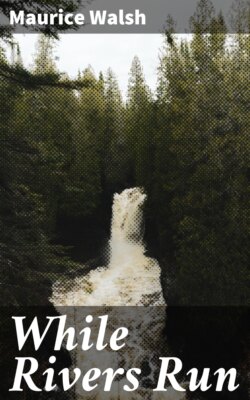Читать книгу While Rivers Run - Maurice Walsh - Страница 5
На сайте Литреса книга снята с продажи.
II
ОглавлениеTable of Contents
Where the water made a sibilant babble in the throat of the pool the angler waded in and commenced to fish; first, quick short casts merely to wet his fly, and then gradually lengthening ones as he moved foot by foot down the boil, until at last his fly, slanting downstream, covered the whole width of the river. Presently he hunched his shoulders in concentration, for the Blue Charm was moving over a likely spot, just where the eddies straightened out into the first wide reach. He was quietly certain that his fly was moving over fish, and, since it was the right fly at the right time and in the right manner, he was equally certain that a fish would rise to it. Moreover, had he failed a hundred times in similar circumstances (and he had), he, as a true angler, would cherish that absolute certainty on the hundred and first occasion.
And then the sudden boil, the electric touch, and the unhasty strike. Not the firm strike of spring, but merely a momentary stiffening of the wrists. By Izaak! he had him. The line went out with a hiss from the unratcheted reel—unratcheted for a reason—and the fisherman set himself in the water, his shoulders back, one finger on the line, and his whole body braced. The hooked fish streaked across the pool and got the line it asked for; it slanted back and downwards and took the line willy-nilly. And there it came out of the water for the first time—a flash crescent of silver, with a black tail whipping savagely.
“Fifteen pounds, if an ounce!” whispered the fisherman.
The salmon straightened out and forged determinedly downtream, the rod holding queerly still in one set curve. Would it stop, or would it break away over the steep tail of the pool—letting the rod jerk straight, and a fragment of gut atrail in the water? The angler held all he dared, and his little finger was stung almost unbearably by the hissing line. A bare half-dozen yards from the suck of the outflow the fish stopped and turned. Now was the critical moment. An old fish, long in the pool, would be inclined towards stubbornness and a bottom stone with a cutting edge. But this was a clean-run fish and his energy barely whetted. Fight he would, and fight he did. He leaped clean out of the water in a down curve and charged up the pool in a furious zigzag. The angler reeled in just as furiously, the point of his rod thrown well behind his shoulder. Not many yards of line had been left on the drum after that first rush, and he was anxious to regain what he could to play with.
From first to last that fight lasted all of twenty minutes, and not a single minute wasted. At the end of fifteen the fish, for the first time, followed the pull of the gut and came within a few yards of his enemy, swaying from side to side and showing glimpses of white belly; but seeing his enemy so close at hand, he went upstream in a last frenzied rush. The beginning of the end! That rush spent him, and he lay sluggish at the end of it. Holding him so, one-handed, the fisherman extracted his gaff from its hiding-place between his shoulders. The point was guarded by a cork, and this he detached with his teeth and held there. Then, with the gaff in the heel of his hand, he slowly wound in his fish—now his fish surely—manœuvring it gently downstream so that at the proper moment it floated past him, lying over on its side and spent utterly. Deftly the gaff was slipped under and driven home with an upward draw. The tail gave one splash and was out of the water—and the game was up.
“Eighteen pounds, anyway,” said the fisherman, backing carefully out of the water. “A cock-fish, and clean as a new shilling.”
As he sat on his heels, one big hand holding the salmon on the gravel, and the other raised for a finishing tap with the gaff-handle, he stiffened in that attitude and his eyes stared along the curve of the shore in front of him. His face lost all expression and his mouth opened a little. His ears had remained open all the time, and what they had heard was the sound of voices from away round the curve—voices modulated by distance and yet with an unpleasant modulation in them.
Now this fisherman was not poaching—not really and truly poaching. He wanted a fish for a certain purpose, and he knew that Sir Hugh MacIan, or Sir Hugh’s keeper, Johnny Ross, would not mind his taking a fish out of Urdog Pool in mid-August—if he could. But that was a matter between Sir Hugh, Johnny, and himself, and not to be bruited abroad amongst strangers. And, since the voices he now heard were strange voices, it was up to him to take the initiative while yet there was time. He took it with a promptitude that showed the character of the man. The veil of alders, heavily underwooded, was at his right shoulder. The rod went butt-first amongst the trees; salmon and gaff were deposited behind the trunk of one; he even took time to remove some fish-scales from the stones before he himself stepped among the branches and leant a shoulder against a twisted bole. In that fading light anyone moving on the beach might look and look again and not see him.
